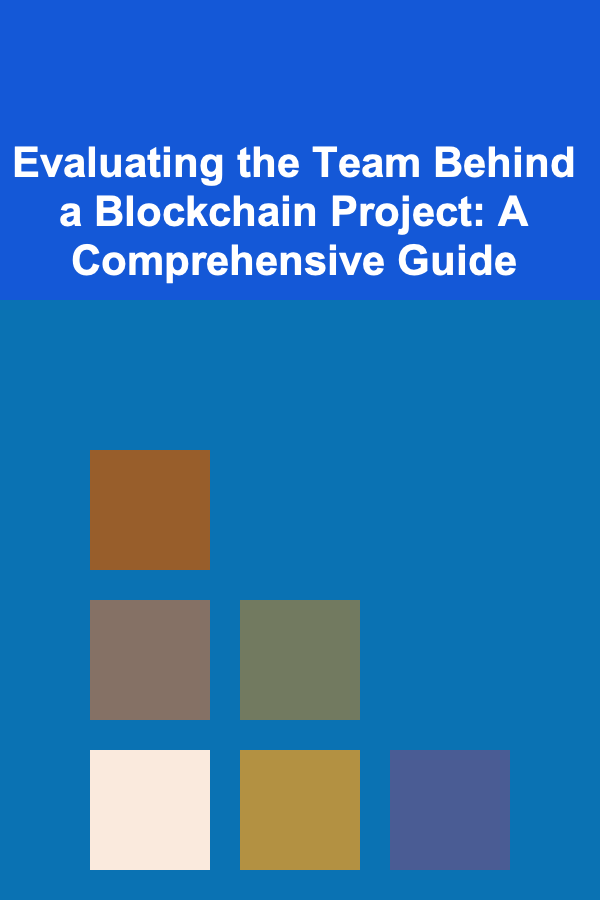
Evaluating the Team Behind a Blockchain Project: A Comprehensive Guide
ebook include PDF & Audio bundle (Micro Guide)
$12.99$9.99
Limited Time Offer! Order within the next:

The blockchain space is rife with innovation, ambition, and, unfortunately, risk. While the technology itself holds immense promise, the success or failure of any blockchain project hinges significantly on the team behind it. A brilliant idea, even when technically sound, can be easily derailed by an incompetent, inexperienced, or even fraudulent team. Therefore, rigorously evaluating the team is paramount for anyone considering investing in, contributing to, or even simply utilizing a blockchain project. This guide provides a comprehensive framework for assessing the team, covering key aspects from technical expertise to ethical considerations.
The Critical Importance of Team Assessment
Before delving into the specifics of team evaluation, it's crucial to understand why this process is so important in the blockchain context:
- Execution is Key: Even the most groundbreaking whitepaper is worthless without a skilled team to execute the vision. The team must be able to translate theoretical concepts into a functional, scalable, and secure blockchain network or application.
- Navigating Complexity: Blockchain technology is inherently complex, requiring a deep understanding of cryptography, distributed systems, game theory, and economics. A strong team possesses diverse expertise across these domains.
- Adapting to Change: The blockchain landscape is constantly evolving. A team must be agile, adaptable, and capable of learning and implementing new technologies to remain competitive.
- Building Trust and Credibility: In a decentralized and often unregulated environment, the team's reputation and integrity are crucial for building trust with investors, users, and the broader community.
- Mitigating Risk: A competent and ethical team is less likely to engage in fraudulent activities, security breaches, or other practices that could jeopardize the project and its stakeholders.
Key Areas of Team Evaluation
Evaluating a blockchain team requires a multifaceted approach, considering their expertise, experience, track record, transparency, and ethical considerations. Here's a breakdown of the key areas to investigate:
1. Technical Expertise and Experience
This is arguably the most critical area of evaluation. The team must possess the necessary technical skills to develop, deploy, and maintain the blockchain platform or application.
- Core Development Team:
- Blockchain Development Experience: How many years of experience do the core developers have specifically working with blockchain technologies (e.g., Ethereum, Bitcoin, Solana, Polkadot)? Have they contributed to other open-source blockchain projects? Look for verifiable contributions on platforms like GitHub.
- Programming Languages: Are they proficient in relevant programming languages (e.g., Solidity, Rust, Go, C++)? The choice of language depends on the specific platform and its requirements.
- Cryptography Expertise: A strong understanding of cryptographic principles is essential for ensuring the security of the blockchain. Look for experience with hash functions, encryption algorithms, digital signatures, and zero-knowledge proofs.
- Distributed Systems Knowledge: Blockchain is inherently a distributed system. The team should have experience designing, building, and managing distributed databases, networks, and consensus mechanisms.
- Smart Contract Development: If the project involves smart contracts, the team needs expertise in writing, testing, and auditing smart contracts to prevent vulnerabilities. Look for experience with formal verification techniques.
- Scalability Solutions: Can the team implement effective scaling solutions (e.g., sharding, layer-2 protocols, sidechains) to handle increasing transaction volumes? Understanding the tradeoffs between different scaling approaches is crucial.
- Security Audits: Does the team prioritize security and conduct regular audits of their code and infrastructure? Are they responsive to bug reports and vulnerabilities?
- Advisory Board:
- Industry Experts: Does the team have advisors with significant experience and recognized expertise in the blockchain industry? Do they have a proven track record of success in similar projects?
- Academic Affiliations: Are any of the advisors affiliated with reputable academic institutions and conducting research in relevant fields (e.g., cryptography, distributed systems)?
- Diversity of Expertise: Does the advisory board provide a diverse range of perspectives, including technical, legal, regulatory, and business expertise?
How to Verify Technical Expertise:
- GitHub Repositories: Examine the team's GitHub repositories for code quality, commit history, contribution activity, and responsiveness to issues. Look for well-documented code and evidence of collaborative development.
- Technical Whitepapers: Scrutinize the technical whitepaper for clarity, completeness, and technical soundness. Is the architecture well-defined? Are the security considerations addressed? Can you find any red flags or unsubstantiated claims?
- Code Audits: Check if the project has undergone independent security audits by reputable firms. Review the audit reports for identified vulnerabilities and the team's response.
- Technical Blog Posts and Presentations: Read any technical blog posts or watch presentations by the team members. Assess their understanding of the technology and their ability to communicate complex concepts effectively.
- Ask Technical Questions: If possible, engage with the team directly and ask technical questions about the project. Assess their depth of knowledge and their willingness to answer questions transparently. Attend AMAs (Ask Me Anything) sessions and community forums.
2. Business Acumen and Experience
Technical expertise alone is not sufficient. The team must also possess strong business acumen to successfully commercialize the technology and navigate the complex business landscape.
- Leadership Team:
- Executive Leadership Experience: Do the CEO and other executive leaders have a proven track record of building and scaling successful companies, especially in the technology sector?
- Industry Experience: Do the leaders have relevant experience in the target industry that the blockchain project aims to disrupt? This provides valuable insights into market needs and competitive dynamics.
- Financial Management: Does the team have experience managing finances, fundraising, and budgeting? Look for evidence of responsible financial management and a clear plan for sustainability.
- Marketing and Communication: Can the team effectively communicate the value proposition of the project to potential investors, users, and partners? Do they have a strong marketing strategy in place?
- Legal and Regulatory Compliance: Does the team understand the legal and regulatory landscape surrounding blockchain technology and cryptocurrency? Are they committed to complying with all applicable laws and regulations?
- Partnerships and Alliances:
- Strategic Partnerships: Has the team established strategic partnerships with other companies or organizations that can help accelerate the project's growth and adoption? Evaluate the credibility and value of these partnerships.
- Community Engagement: Is the team actively engaged with the blockchain community? Do they participate in industry events and contribute to open-source projects? A strong community presence can foster trust and collaboration.
How to Verify Business Acumen:
- LinkedIn Profiles: Review the LinkedIn profiles of the leadership team to assess their experience, skills, and connections. Look for evidence of leadership roles, successful ventures, and relevant industry experience.
- Company Website and Documentation: Examine the company website and documentation for a clear articulation of the business model, revenue streams, and target market.
- Financial Reports: If available, review the company's financial reports to assess its financial health and sustainability.
- Press Coverage and Media Appearances: Look for press coverage and media appearances of the team members. Assess their ability to articulate the project's value proposition and respond to critical questions.
- Due Diligence: Conduct thorough due diligence on the team's previous ventures and investments. Are there any red flags or potential conflicts of interest?
3. Transparency and Communication
Transparency is crucial in the blockchain space. A team that is open and communicative about its progress, challenges, and decisions is more likely to build trust with the community.
- Open Communication Channels:
- Regular Updates: Does the team provide regular updates on the project's progress through blog posts, newsletters, social media, and other channels?
- Active Community Engagement: Is the team actively engaged with the community on platforms like Telegram, Discord, Reddit, and Twitter? Do they respond to questions and concerns in a timely and transparent manner?
- Public Roadmaps: Does the team have a public roadmap that outlines the project's milestones and timelines? Is the roadmap realistic and achievable?
- Progress Reporting: Does the team provide regular progress reports against the roadmap? Do they explain any delays or changes in plans transparently?
- Open-Source Code:
- Code Availability: Is the project's code open-source and publicly available on platforms like GitHub? This allows the community to review the code, identify vulnerabilities, and contribute to the project.
- Open Development Process: Does the team follow an open development process, where the community can participate in discussions and contribute to the code?
- Documentation:
- Comprehensive Documentation: Does the team provide comprehensive documentation for the project, including technical specifications, API documentation, and user guides?
- Clear and Concise Language: Is the documentation written in clear and concise language that is easily understandable by both technical and non-technical users?
How to Assess Transparency and Communication:
- Review Communication Channels: Monitor the team's communication channels (e.g., blog, social media, forums) to assess their responsiveness, transparency, and willingness to engage with the community.
- Read the Whitepaper and Documentation: Scrutinize the whitepaper and documentation for clarity, completeness, and consistency.
- Check GitHub for Open-Source Code: Verify that the project's code is open-source and publicly available on GitHub. Review the code for quality, documentation, and contribution activity.
- Attend Community Events: Attend community events like AMAs and webinars to interact with the team and ask questions.
- Look for Red Flags: Be wary of teams that are secretive, evasive, or unwilling to answer questions transparently.
4. Track Record and Reputation
The team's past performance and reputation are important indicators of their ability to deliver on their promises. It's essential to research their previous ventures and assess their successes and failures.
- Previous Projects:
- Successes and Failures: What projects have the team members worked on in the past? What were the outcomes of those projects? Did they achieve their goals? What lessons did they learn from their failures?
- Reputation in the Industry: What is the team's reputation in the blockchain industry? Are they respected and trusted by their peers? Have they been involved in any controversies or scandals?
- Scam Alerts/Allegations: Research for any history of association with scams or fraudulent activities by any member.
- Professional Networks:
- Connections and Relationships: What kind of connections and relationships does the team have within the blockchain industry? Do they have strong relationships with investors, developers, and other key stakeholders?
- References: Can the team provide references from previous employers, clients, or partners? Contact those references to gather feedback on the team's performance and reputation.
- Media Coverage:
- Positive and Negative Coverage: What kind of media coverage has the team received in the past? Has the coverage been positive or negative? Are there any red flags or potential concerns raised in the media?
How to Investigate Track Record and Reputation:
- Google Searches: Conduct thorough Google searches on the team members and the project. Look for any articles, blog posts, or forum discussions that mention their past performance or reputation.
- Social Media Research: Search for the team members and the project on social media platforms like Twitter, LinkedIn, and Reddit. See what people are saying about them and their work.
- Blockchain Forums and Communities: Participate in blockchain forums and communities to gather feedback on the team's reputation and track record.
- Due Diligence on Previous Ventures: Conduct thorough due diligence on the team's previous ventures and investments. Are there any red flags or potential conflicts of interest?
- Background Checks: Consider performing background checks on key team members, especially those in leadership positions.
5. Ethical Considerations and Security
In the largely unregulated blockchain space, ethical considerations are paramount. The team's integrity and commitment to security are crucial for protecting investors and users.
- Conflicts of Interest:
- Disclosure of Conflicts: Has the team disclosed any potential conflicts of interest? Do any of the team members have financial interests in competing projects?
- Management of Conflicts: How does the team manage potential conflicts of interest to ensure fairness and transparency?
- Security Practices:
- Security Audits: Does the team prioritize security and conduct regular audits of their code and infrastructure?
- Bug Bounty Programs: Does the team have a bug bounty program to encourage the community to identify and report vulnerabilities?
- Data Privacy: How does the team protect user data and privacy? Are they compliant with relevant data privacy regulations (e.g., GDPR)?
- Response to Security Breaches: Does the team have a plan in place for responding to security breaches and incidents? How quickly and effectively do they respond to such incidents?
- Commitment to Decentralization:
- Token Distribution: Is the token distribution fair and equitable? Is a significant portion of the tokens held by the team or insiders?
- Governance Model: Does the project have a decentralized governance model that allows the community to participate in decision-making?
- Resistance to Censorship: Is the project resistant to censorship and control by centralized entities?
How to Assess Ethical Considerations and Security:
- Review the Whitepaper and Documentation: Look for statements about the team's commitment to ethics, security, and decentralization in the whitepaper and documentation.
- Check for Conflict of Interest Disclosures: Look for disclosures about potential conflicts of interest on the company website or in the documentation.
- Examine Security Practices: Review the team's security practices, including security audits, bug bounty programs, and data privacy policies.
- Analyze Token Distribution: Analyze the token distribution to assess whether it is fair and equitable.
- Evaluate the Governance Model: Evaluate the project's governance model to assess the level of community participation and decentralization.
Red Flags to Watch Out For
Several red flags should raise concerns during the team evaluation process:
- Anonymous Team Members: Teams that hide their identities are inherently suspicious. Transparency is crucial in the blockchain space.
- Exaggerated Claims and Promises: Be wary of teams that make unrealistic claims or promises about the project's potential.
- Lack of Technical Expertise: If the team lacks the necessary technical expertise to develop and deploy the blockchain platform or application, it's a major red flag.
- Poor Communication and Transparency: Teams that are secretive, evasive, or unwilling to answer questions transparently should be avoided.
- History of Scams or Fraud: Avoid teams with a history of involvement in scams or fraudulent activities.
- Unrealistic Tokenomics: Tokenomics that heavily favor the team or insiders are often a sign of a potential rug pull.
- Lack of a Clear Business Model: If the project lacks a clear and sustainable business model, it's unlikely to succeed in the long run.
- Aggressive Marketing Tactics: Overly aggressive or misleading marketing tactics can be a sign of a struggling project trying to attract attention.
- Constant Delays and Missed Deadlines: While delays are common in the blockchain space, a pattern of constant delays and missed deadlines can indicate poor management or technical challenges.
Conclusion
Evaluating the team behind a blockchain project is a crucial step in mitigating risk and maximizing the chances of success. By carefully assessing the team's technical expertise, business acumen, transparency, track record, and ethical considerations, you can make a more informed decision about whether to invest in, contribute to, or utilize the project. Remember to conduct thorough due diligence, ask critical questions, and be wary of red flags. In the ever-evolving landscape of blockchain technology, a strong and trustworthy team is the foundation for long-term success. This detailed evaluation process, while time-consuming, is a necessary investment to protect yourself from potential scams and poorly executed projects and to contribute to the growth of legitimate and valuable blockchain initiatives.
Reading More From Our Other Websites
- [Personal Investment 101] How to Use Deep Learning for Predictive Analytics and Earn Passive Income
- [Simple Life Tip 101] Best Eco‑Friendly Personal Care Products for a Minimalist Lifestyle
- [Survival Kit 101] How to Design a Survival Kit for Home‑Office Workers During Extended Power Outages
- [Rock Climbing Tip 101] From %>^ to %>!: How Climbing Grades Have Evolved Over Time
- [Small Business 101] Top Benefits of Having a Business Checking Account for Small Business
- [Home Lighting 101] How to Maintain Your Home's Lighting Fixtures for Longevity
- [Personal Care Tips 101] How to Pick the Right Moisturizer for Dry Skin
- [Home Renovating 101] How to Design a Functional Mudroom During a Home Renovation
- [Metal Stamping Tip 101] Sustainability on the Assembly Line: Eco‑Friendly Metal Stamping Practices in the Auto Industry
- [Trail Running Tip 101] Step-by-Step Guide to Using Trail Running as a Mindful Practice

How to Integrate Clear Call-to-Actions (CTAs) on Your Website
Read More
How to Retain Customers for Long-Term Profit
Read More
How to Understand Different Dietary Approaches (e.g., Paleo, Vegan)
Read More
Why Organizing Your Workspace Can Boost Productivity
Read More
How to Build a Community Around Your Brand
Read More
How to Design a Bill Payment Planner for Maximum Efficiency
Read MoreOther Products

How to Integrate Clear Call-to-Actions (CTAs) on Your Website
Read More
How to Retain Customers for Long-Term Profit
Read More
How to Understand Different Dietary Approaches (e.g., Paleo, Vegan)
Read More
Why Organizing Your Workspace Can Boost Productivity
Read More
How to Build a Community Around Your Brand
Read More